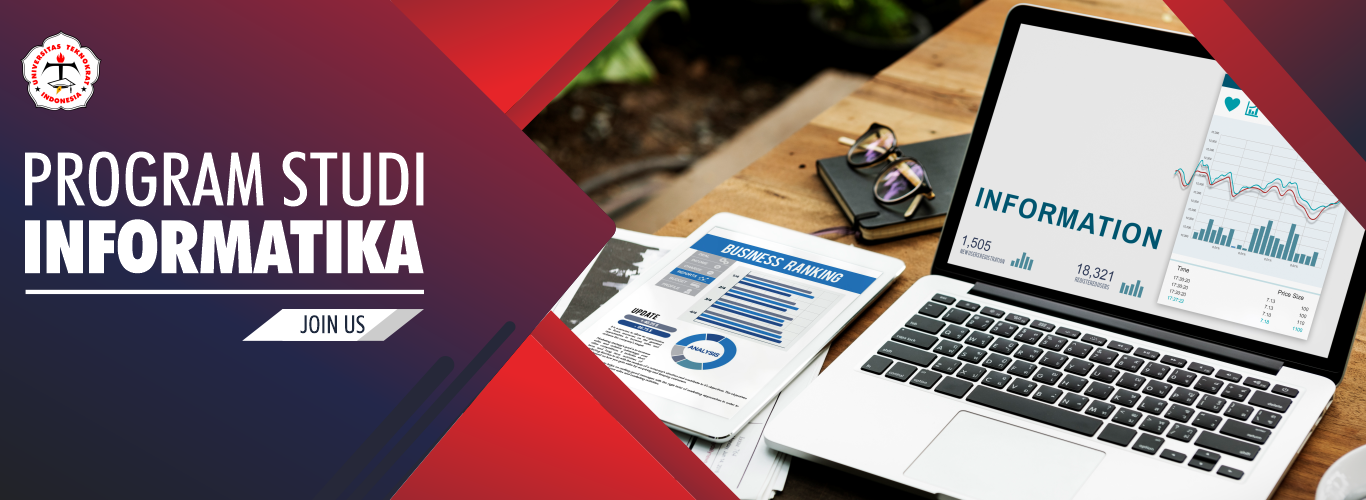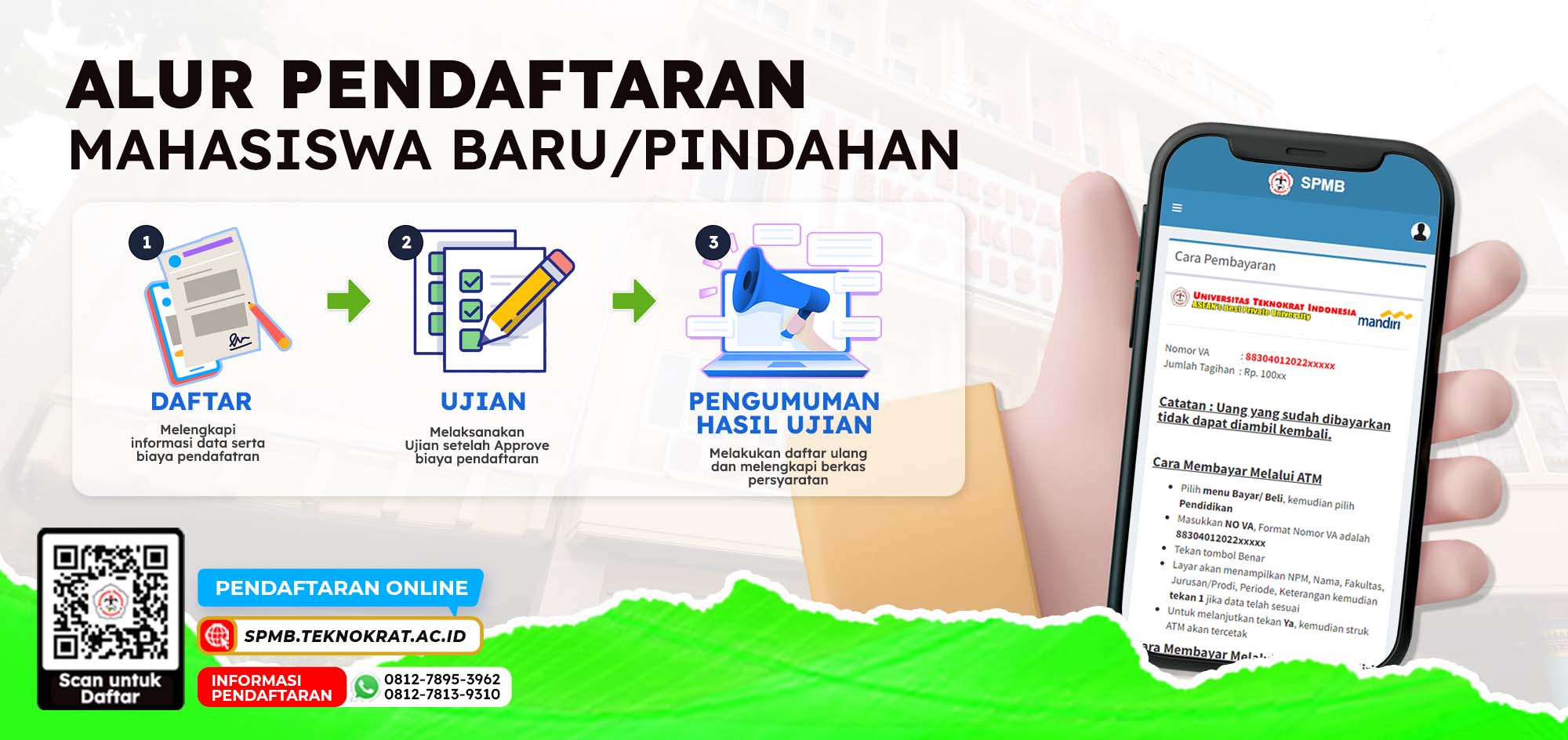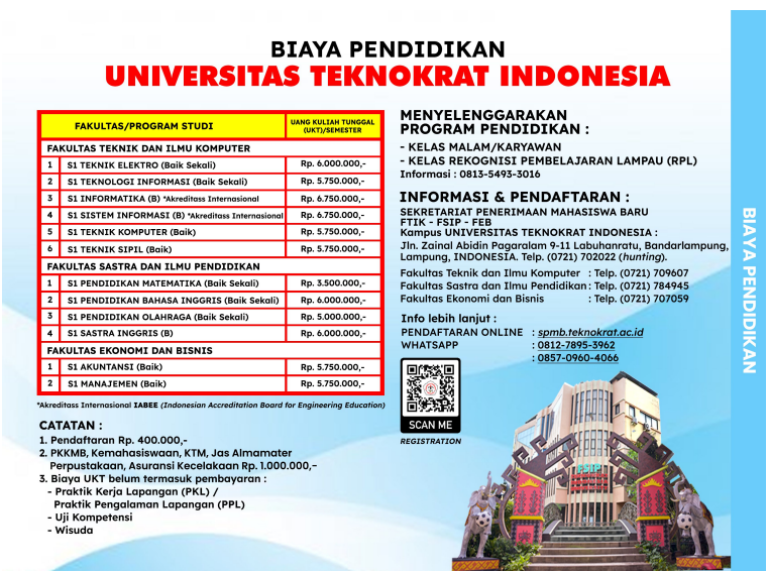
Program Studi S1 Informatika adalah program studi yang telah diselenggarakan sejak tahun 2001 dengan nama program Studi Teknik Informatika yang diselenggarakan oleh Sekolah Tinggi Manajemen Informatika dan Komputer (STMIK) Teknokrat yang telah digabungkan ke dalam Universitas Teknokrat Indonesia. Karena adanya penyesuaian nomenklatur program studi, nama Program Studi Teknik Informatika berubah nama menjadi Program Studi Informatika dan ditetapkan oleh Kementrian Riset, Teknologi, dan Pendidikan Tinggi Nomor 494/KPT/I/2017 tanggal 19 Januari 2017.
A. Visi Program Studi
Program Studi S1 Informatika memiliki visi: “Menjadi Program Studi Informatika yang unggul dan berstandar internasional di Indonesia tahun 2030 pada bidang pengembangan perangkat lunak dan sistem cerdas serta berperan aktif dalam Pembangunan Bangsa melalui Pendidikan, Penelitian dan Pengabdian kepada Masyarakat”.
B. Misi Program Studi
Untuk mewujudkan cita-cita Program Studi S1 Informatika sebagaimana dinyatakan dalam visi program studi dan untuk mendukung pencapaian visi Fakultas Teknik dan Ilmu Komputer (FTIK), Program Studi S1 Informatika mengemban misi sebagai berikut:
C. Tujuan Program Studi
Berpijak pada visi dan misi di atas, tujuan yang ingin dicapai Program Studi Informatika dalam pelaksanaan Tri Dharma Perguruan Tinggi adalah :
Kurikulum 2021
Terbitnya Perpres No. 08 tahun 2012 dan UU PT No. 12 Tahun 2012 Pasal 29 ayat (1), (2), dan (3) tentang Kerangka Kualifikasi Nasional Indonesia (KKNI) dijadikan sebagai dasar dalam mengembangkan kurikulum di program studi S1 Teknik Elektro yang dikembangkan mengacu pada capaian pembelajaran (learning outcomes).
Capaian Pembelajaran (learning outcomes) merupakan internalisasi dan akumulasi ilmu pengetahuan, ketrampilan, sikap, dan kompetensi yang dicapai melalui proses pendidikan yang terstruktur dan mencakup suatu bidang ilmu/keahlian atau melalui pengalaman kerja. Capaian pembelajaran lulusan S1 Teknik Elektro diturunkan dari profil lulusan dengan meninjau tiga unsur yaitu:
Unsur pertama: nilai-nilai yang dicanangkan UTI (University Value) mengacu pada prinsip penyelenggaraan pendidikan dari Yayasan Pendidikan Teknokrat yang tersirat pada slogan menyelenggarakan pendidikan yang “Disiplin, Bermutu, Kreatif dan Inovatif”.
Unsur kedua: telaah keilmuan dan keahlian (Scientific Vision) program studi didasarkan pada visi keilmuan ke depan yang bermuara pada azas manfaat bagi kesejahteraan masyarakat. Telaah keilmuan dan keahlian dilakukan dengan mengacu pada praktik terbaik (best practice) internasional yang disusun dan dikeluarkan oleh ACM (Association for Computing Machinery) dan IEEE (Institute of Electrical and Electronics Engineers). Hasilnya, Scientific Vision program studi S1 Teknik Elektro
UTI memiliki Knowledge Area meliputi communications, control systems, digital signal processing, electromagnetics, digital & analog electronic circuits, biomedical, computer and power systems.
Unsur ketiga: Peninjauan kebutuhan masyarakat pemangku kepentingan (Market Signals) ditujukan untuk mengetahui tingkat kebutuhan masyarakat, industri, dan pemangku kepentingan terhadap lulusan Program Studi S1 Teknik Elektro.
Berikut pemetaan matakuliah pada kurikulum S1 Teknik Elektro dalam tiap semester:

Daftar Mata Kuliah:
Program Educational Objectives
The principal engineering values are officially expressed as Program Educational Objectives (PEOs). These principal values are formulated in accordance with the visions and missions of the university, the faculty of engineering and the electrical engineering study program. The formulation of these principal values generally takes the advice of the user, advisory board, alumni, and professional associations into account. The PEOs are composed of the following important keywords:
The PEOs, which are formulated according to all visions and missions from the university level to the study program level, must become the living manifestation of all graduates and alumni. Based on the aforementioned four important keywords, we formulate our PEO as follows.
We expect our graduates to:
PEO1 (character): Having a good spirit of leadership, high standard ethics, and lifelong learning to maintain excellence in innovation.
PEO2 (career): Be successful in a technical or professional career characterized by having integrity in the aspect of electrical engineering competency or related field by fulfilling professionalism, effective communication, and universal value of humanity.
Student Outcomes
By considering the mission statement of the university, faculty, and department as well as suggestions from stakeholders, advisory board, and accreditation institutions both local and international (in this case Washington Accord), the electrical engineering study program determines eleven student outcomes (SO) that are aligned with graduate attributes defined by ABET. The outcomes of the electrical engineering study program are stated as follows.
KP.1: Engineering Knowledge. Ability to apply natural science, mathematics, and engineering fundamental theory and other relevant fields to solve complex engineering problems
KP.2: Problem Analysis. Ability to analyze and employs the existing approaches, resources, and appropriate equipment to solve complex engineering problems and their activities.
KP.3: Design/Development of Solutions. Ability to design a system, component, or process to meet desired needs within realistic constraints such as economic, environmental, social, political, ethical, health and safety, manufacturability, and sustainability.
KP.4: Data and ExperimentsSO(d). Ability to design and conduct experiments to investigate the complex engineering problem as well as to analyze and interpret data.
SK.1: Modern Equipment UsageSO(e). Capabilities to create, select, and implement engineering, resource, and modern engineering device and information technology for complex engineering problem
SK.2: Knowledge of Contemporary Issues. Ability to think logically to evaluate health, social, safety, legal, and cultural issues to the recent knowledge and science, and be responsible in performing engineering activities and solutions to complex engineering problem.
SK.3: Effective communication. Ability to communicate effectively and confidently in performing complex engineering activities.
SK.4: Individual and Teamwork. Ability to have a role effectively as individual and team to achieve common goals in a multidisciplinary environment.
BH.1: Ethics and Responsibility. The ability to apply ethical values and committed to the norms, responsibilities, and ethics of engineering profession. In the context of the Indonesian society, the values and norms that are considered and accepted in engineering other than universal common humanitarian norms should also include the principles of Pancasila, local cultural values, and national interests.
BH.2: Environment and Sustainability. The broad education necessary to understand the impact of engineering solutions in a global, economic, environmental, and societal context.
BH.3: Continuous Learning. Ability to realize the importance of lifelong learning and ability to carry it out
To achieve the Program Educational Objectives (PEOs), the Student Outcomes (SOs) had been designed carefully to support the PEO. Therefore, when the target for the SOs is accomplished, it is sufficient to say that the PEO will have high probability to be accomplished within 5 years after graduation.
–
Profil Lulusan Program Studi Teknik Elektro
–
–
A. Alur Pendaftaran
Calon Mahasiswa/i dapat mendaftar secara offline atau online dengan mengunjungi website spmb.teknokrat.ac.id
Berikut ini adalah Alur Pendaftaran Mahasiswa Baru:

B. Cara Membuat Akun
Membuat akun pendaftaran dengan mengisikan alamat email, nomer Hp dan password.
C. Biaya Pendaftaran
Biaya Pendaftaran sebesar Rp. 400.000,- untuk semua jurusan.
D. Biaya PKKMB
Biaya sebesar Rp. 1.000.000,- meliputi PKKMB, Kemahasiswaan, KTM, Jas Almamater, Perpustakaan dan Asuransi Kecelakaan.
E. Jadwal Penerimaan
Berikut ini adalah jadwal Penerimaan Mahasiswa Baru Tahun Ajaran 2024/2025:

Berikut ini adalah Biaya Pendidikan pada Program Studi S1. Sistem Informasi:
A. Biaya Reguler

B. Biaya Kelas Karyawan dan RPL
